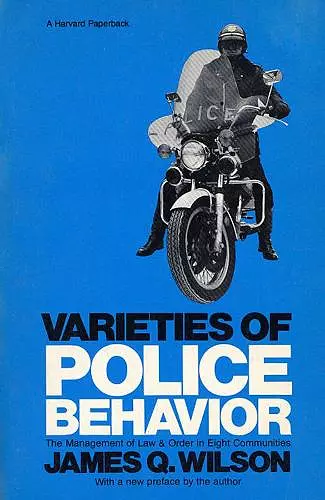Varieties of Police Behavior
The Management of Law and Order in Eight Communities, With a New Preface by the Author
Format:Paperback
Publisher:Harvard University Press
Published:31st Jan '78
Currently unavailable, and unfortunately no date known when it will be back

It is, without doubt, the finest book on the American police ever written, and Professor Wilson is one of our best-known scholars of urban affairs...Rich...full to the brim with increasing details and shrewd insight. Anyone who wants to have an informed opinion about the policeman's relations to law and order ought to read it. -- Irving Kristol
In his new preface, Wilson reviews changes in police styles during the past decade, and explains the reasons for these changes. Varieties of Police Behavior remains unsurpassed in delineating the role of the patrolman and the problems he faces due to constraints imposed by law, politics, public opinion, and the expectations of superiors.
The patrolman has the most difficult, complex, and least understood task in the police department. Much less is known of him than of his better publicized colleague, the detective. In this important and timely book, James Q. Wilson describes the patrolman and the problems he faces that arise out of constraints imposed by law, politics, public opinion, and the expectations of superiors.
The study considers how the uniformed officer in eight communities deals with such common offenses as assault, theft, drunkenness, vice, traffic, and disorderly conduct. Six of the communities are in New York State: Albany, Amsterdam, Brighton, Nassau County, Newburgh, and Syracuse. The others are Highland Park, Illinois, and Oakland, California.
Enforcing laws dealing with common offenses is especially difficult because it raises the question of administrative discretion. Murder, in the eyes of the police, is unambiguously wrong, and murderers are accordingly arrested; but in cases such as street-corner scuffles or speeding motorists, the patrolman must decide whether to intervene (should the scuffle be stopped? should the motorist be pulled over?) and, if he does, just how to intervene (by arrest? a warning? an interrogation?). In most large organizations, the lowest-ranking members perform the more routinized tasks and the means of accomplishing these tasks are decided by superiors, but in a police department the lowest-ranking officer—the patrolman—is almost solely responsible for enforcing those laws which are the least precise, the most ambiguous. Three ways or “styles” of policing—the watchman, the legalistic, and the service styles—are analyzed and their relation to local politics is explored.
In the final chapter, Mr. Wilson discusses if and how the patrolman’s behavior can be changed and examines some current proposals for reorganizing police departments. He observes that the ability of the patrolman to do his job well may determine our success in managing social conflict and our prospects for maintaining a proper balance between liberty and order.
[Varieties of Police Behavior] must unquestionably become an indispensable study of politics in the American city. It is based on enormous and detailed research… The material is presented in a controlled and disciplined no-nonsense style. * New York Review of Books *
This is surely one of the most informative books about the police ever written… Varieties of Police Behavior is a rich, sophisticated book by an author unusually able to tackle the comprehensiveness and interdependence of the issues which affect police performance, and [James Q. Wilson’s] analysis and conclusions have much to teach. * Times Literary Supplement *
[This book] is a departure from the traditional treatise…and actually does take a large and long-awaited step toward revitalizing an exciting and important but inexcusably weak area of political science. * American Political Science Review *
It is, without doubt, the finest book on the American police ever written, and Professor Wilson is one of our best-known scholars of urban affairs… Rich…full to the brim with increasing details and shrewd insight. Anyone who wants to have an informed opinion about the policeman’s relations to law and order ought to read it. -- Irving Kristol
ISBN: 9780674932111
Dimensions: 208mm x 133mm x 20mm
Weight: 431g
326 pages
2nd edition